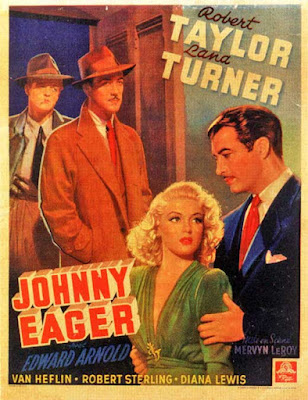Parole Johnny Eager is surrounded by two bards, one a knockout blonde and the other his Shakespeare-quoting friend, and soon Johnny learns the grafts the thing, wherein he’ll catch the conscience of the kingpin. Mervyn LeRoy’s direction focuses upon the actors and not their acts, telling a story between the violence so we witness the emotional and psychological toll that eats up their lives. As Johnny becomes more human, he becomes more vulnerable, and when he finds his pulse, he loses it. What a wonderful film.
Johnny Eager (Robert Taylor) lives a duplicitous life: he masquerades as a Taxi Driver to fool his Parole Office by day and assumes his true identity of gangster top dog (as in Greyhound) at sunset! Johnny is smart, tough, and charming, a man as sincere as a heart attack who lacks even the slightest ounce of compassion. His selfishness is as toxic a radium and eventually poisons everyone around him. His only friend Jeff (Van Heflin) is a drunken poet, a Proustian compatriot who wears his own heart on his sleeve, but Johnny is too blind to see. The triptych is completed by the sultry yet guileless Lisabeth Bard (Lana Turner), a college intern who falls for Johnny, the bad boy who embodies the antithesis of her DA stepfather John Farrell (Edward Arnold), though both men are dominating in different ways. The plot involves Johnny’s eagerness to open a dog racing track, but the DA is the key to lifting the injunction, so fate intervenes and Lisabeth becomes the perfect leverage. Murder, mayhem, and broken hearts ensue.
The acting is the key to the film as the complicated story takes a back seat to the psychology of the characters. Though Johnny’s selfishness could be relegated to a one-note performance, Robert Taylor is able to infuse his character with a subtle humanity, so even when he’s selling out his cohorts and dames, we feel the glimmer of regret in the darkness of his actions. Lana Turner as the femme amour subverts the trope and is revealed to be a decent gal, not wanting his money or expensive gifts, but just Johnny himself: she can see the fella beneath the felon. But it’s Van Heflin as his best and only friend who steals the film (and the Academy Award for best Supporting Actor!) with his quicksilver riposte and his barely concealed queerness for his pal. Heflin’s drunken soliloquy where he exposes his very soul is achingly tender, spoken to another man who is intoxicated with himself.
Finally, Johnny’s past catches up with him as badge #711 and he meets his end when he becomes reborn, committing one final unselfish act to save Lisabeth. She may be safe, but he dies in the arms of his true love.
Final Grade: (B+)
